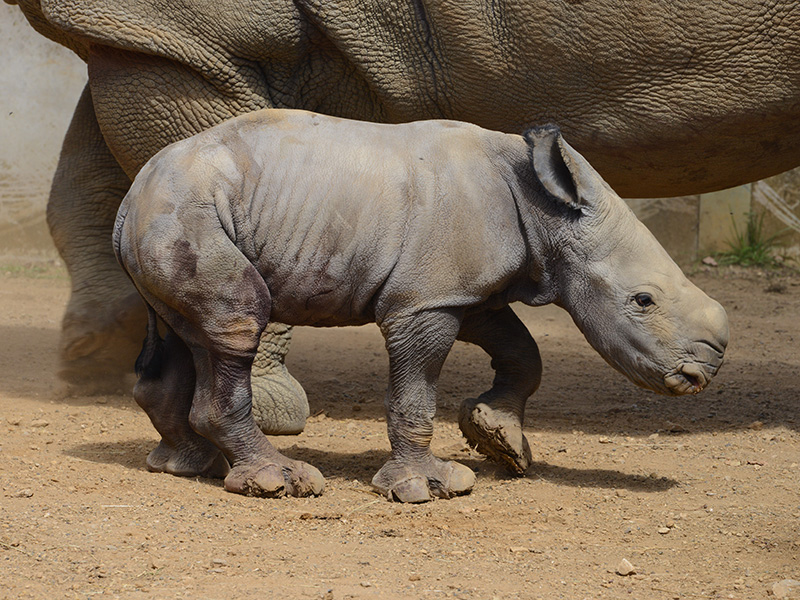Another Rhino! New arrival at Cotswold Wildlife Park

D'ora the White Rhino - born 21 July 2020.
D'ora is the newest addition to the Rhino family at Cotswold Wildlife Park & Gardens. She is the seventh Rhino calf to be born at the Park. The six-week-old youngster is healthy and nursing well from mum Nancy who is proving, once again, to be an exceptional mother. D'ora's name incorporates the French word for gold ('or') as the Park celebrates its golden anniversary this year (it first opened to the public on 27th March 1970).
Father Monty and Nancy are both sixteen years old. In 2009, Nancy (along with another female called Ruby) made the eleven thousand kilometre journey from Mafunyane Game Farm in South Africa to the UK to join young male Monty at their new Oxfordshire home. It was hoped that, one day, they would successfully produce the Park’s first ever Rhino calf. Four years later, Nancy gave birth to a female named Astrid (on 1st July 2013).
Reggie Heyworth, the Park’s Managing Director and a Tusk Trust Ambassador, explains: “Conservation programmes throughout Africa’s wildlife areas and national parks often depend on income from tourism and support from charities such as Tusk Trust. With so few tourists visiting Africa, it is all the more important for us to support the work of Tusk Trust, who fund over forty programmes throughout sub-Saharan Africa, including vital work to protect rhinos and elephants from poachers”.
Females only reproduce every two-and-a-half to five years, so the window of opportunity for successful reproduction is limited. After a gestation period of sixteen to eighteen months, a single calf is born. A newborn calf will stand up within one hour of birth and immediately attempt to suckle, although may be a little unsteady on her feet for the first few days. She will remain under the watchful eye of her mother, suckling from her for approximately one year. Their bond is an intensely strong one and the calf will remain with her mother for at least two years, benefiting from her protection. Females guard their offspring aggressively and are intimidating adversaries if challenged.
White Rhinos (Ceratotherium simum ssp. simum) have always been an important species at the Park, which was founded by Mr John Heyworth in 1970. His son Reggie Heyworth is now Managing Director of Cotswold Wildlife Park. Unbelievably, these iconic animals were once the rarest subspecies of any Rhino and were on the verge of extinction in the early 1900s, when it was believed only twenty to fifty animals remained in their native African homeland. Thanks to excellent and sustained protection, they are now the most common of the five Rhino subspecies, although poaching in the last five years has once again escalated to serious levels, driven by demand for Rhino horn from the traditional medicine market of China and the Far East.
Interesting Facts
- Nancy gave birth to Astrid, the Park’s first Rhino calf, on 1st July 2013.
- Cotswold Wildlife Park is committed to Rhino conservation and has raised over £120,000 for conservation work in Africa in the last ten years through various fundraising events. To find out more please visit https://www.cotswoldwildlifepark.co.uk/conservation.
- White Rhinos are the largest of the five Rhino species and range throughout the grassland of Southern Africa.
- The name ‘Rhinoceros’ translates directly from Greek as ‘nose-horn’.
- The collective noun for a group of Rhinos is a ‘crash’.
Cotswold Wildlife Park is open daily from 10am (except Christmas Day).
Photo credit: Rory Carnegie
Explore Gloucestershire
3 September 2020
For further information.
OTHER NEWS
